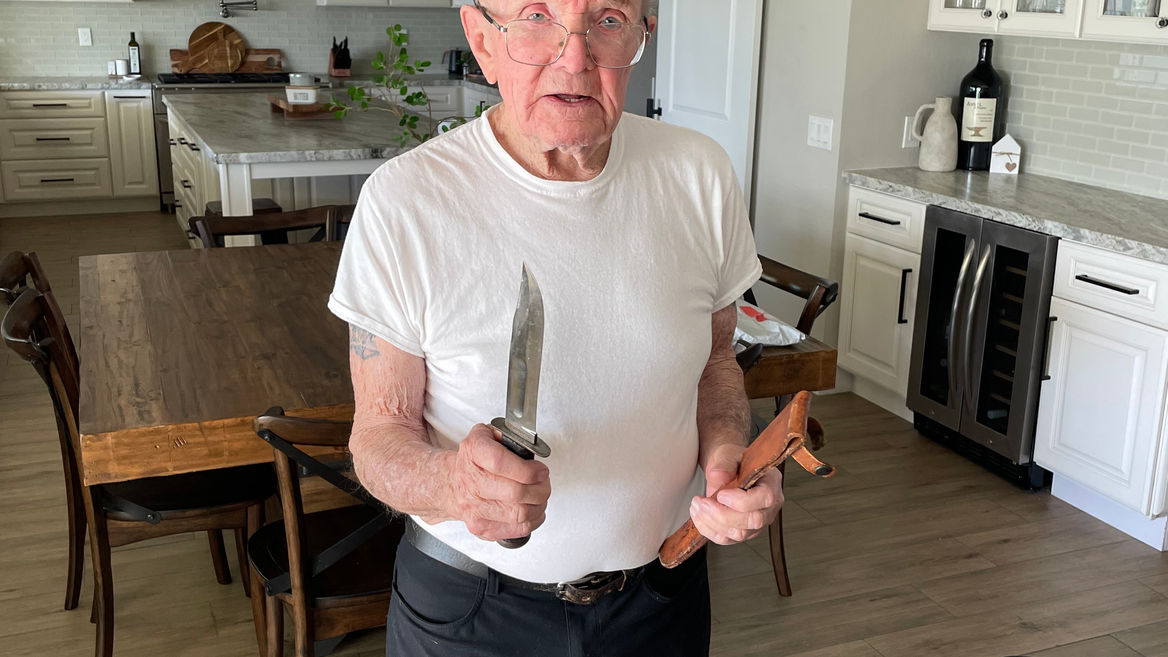Kenneth Smith
Private First Class
1st Marine Division
5th Marine Regiment
1st Battalion, Company a
Machine gun platoon
Kenneth W Smith served in the Marine Corps from 1951 to 1954. During the Korean War, Kenneth served with Able Company’s Machine Gun Platoon, 1st Battalion, 5th Marines, 1st Marine Division. During his time in the Marine Corps, he earned two Purple Hearts and was twice promoted to the rank of Private First Class. (Liberty in Japan has that effect.)
Born in 1934, Kenneth recalls learning of the attacks on Pearl Harbor from a neighborhood friend. He recalls that no one knew who the Japanese were or where Pearl Harbor was. Following in the footsteps of his neighbor, Bill, who served in the Marine Corps during World War II, Kenneth enlisted in the Marine Corps in August 1951 after convincing his mother to sign the paperwork. From here, Kenneth began training with Mike Company at Parris Island. He recalls that most of the DIs were veterans of World War II. While in boot camp, Smith recalls having a premonition that he would be sent to fight in Korea.
After training, Kenneth went on a week's leave before leaving for Camp Pendleton, where they received 782 gear and a rifle. Here, they received a brief amount of additional training on the M1 Rifle and spent the rest of the time being told to run up and down the hills of Pendleton. This would be the only additional training Kenneth and his fellow Marines would receive before being sent to Korea..
In March, when he arrived in Pusan, Kenneth recalls seeing a Marine with a roster sorting the arrivals to their respective units. Kenneth quickly learned he was assigned to the 5th Marines and was placed on trucks and sent to his outfit near the Punchbowl. Once Kenneth arrived at Able Company, he was assigned to the Machine Gun platoon, which he “knew nothing about,” where he became an ammo carrier for the platoon’s M1919s.

It wasn't long before Kenneth would be sent to the front, where he recalled, “it was all Chinese, there were no North Koreans to be found.” The Chinese were constantly trying to break through their lines. The 1st Marines were then sent to block a potential Chinese counterattack on the other side of Korea. Kenneth recalls the unit being on both sides of the Han River, with the division being stretched over 25 miles. The division erected outposts, and this is where Kenneth would experience near constant combat until he was wounded and evacuated to Japan. Kenneth recalled most of the engagements as point shooting, with the Chinese Soldiers coming closer than 25 yards of their position. At this point, little ground was taken, and combat resembled trench warfare.
During one engagement, a Chinese soldier jumped on Kenneth and began engaging him in hand-to-hand combat. With the Soldier on top of him, Kenneth quickly unstrapped his Ka-Bar, which he kept attached to his boot, and plunged it into the Chinese soldier's neck.
On another occasion, Kenneth and a fellow Marine were watching their sector in a foxhole when two Chinese soldiers jumped into their hole, engaging the pair in hand-to-hand combat. Kenneth again turned to his Ka-Bar and killed the Soldier who was attacking him. He then ran to his buddy, who had a Chinese soldier on top of him, and slit the Chinese soldier's throat. When the pair returned to their outfit the next morning, Kenneth recalled they were both covered in blood, “but none of it was ours.”
When he returned to the States, PFC Smith was assigned to drill instructor school, which lasted for one month, before he was assigned to Mike Company, the very same company he was a recruit in. Smith was surprised to find his former drill instructor was still there, and was equally surprised that Smith was now his peer. Smith soon became a Senior Drill Instructor as a PFC, and when an officer saw this, he quickly promoted Smith to Corporal to avoid any weird looks.
After leaving Parris Island, Kenneth was assigned to the 3rd Marine Division in Japan and was a Machine Gun section leader. The gun platoon was a tight group, and Smith recalls all of them going out together on liberty frequently. Smith remembers being “shit face drunk all the time,” and on one particular occasion, the group was returned to base in a Japanese police paddy wagon. It was one of these excursions that cost Smith his stripes. A few months later, Smith would finish his enlistment and move to California, where he would eventually become a trooper with the California Highway Patrol, where he would serve unit he retired.








